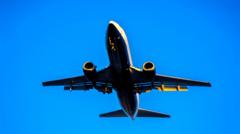The article text:
Boeing workers have voted to accept the aviation giant's latest pay offer, concluding a challenging seven-week-long strike. The new contract ensures a 38% pay increase over the next four years for the employees.
Workers who participated in the strike can expect to return to their jobs starting as early as Wednesday, extending to as late as November 12, according to the International Association of Machinists and Aerospace Workers (IAM) union. The strike, involving approximately 30,000 Boeing workers, commenced on September 13 and significantly hampered operations at Boeing's factories, exacerbating existing crises within the corporation.
The IAM reported that 59% of the striking workers backed the new deal, which also features a one-time bonus of $12,000 (£9,300) for employees and significant changes to the retirement plans offered to them. Union leader Jon Holden emphasized the importance of the strike, stating it represented a stand for respect and equitable wages in the workplace.
Boeing's CEO, Kelly Ortberg, remarked on the challenges faced by the workforce during this period, affirming the commitment to returning to the standards that have historically made Boeing a leading figure in the industry.
The strike also drew attention at a national level, with acting US Labor Secretary Julie Su flying to Seattle last month to assist in negotiations, underscoring the strike's significance at one of the country's pivotal companies.
Boeing has faced financial struggles during the strike, with estimates of nearly $10 billion in losses, as reported by consulting firm Anderson Economic Group. The company's commercial aircraft division recorded a $4 billion operating loss for the quarter ending in September. In a bid to recuperate financially, Boeing announced a share sale aimed at raising upwards of $20 billion and indicated plans to lay off 17,000 employees, with initial notices expected in mid-November.
The turmoil at Boeing escalated earlier this year following a high-profile incident involving a mid-air blowout on one of its passenger planes, while its space division suffered a setback when the Starliner vessel was forced back to Earth without astronauts on board.
Boeing workers have voted to accept the aviation giant's latest pay offer, concluding a challenging seven-week-long strike. The new contract ensures a 38% pay increase over the next four years for the employees.
Workers who participated in the strike can expect to return to their jobs starting as early as Wednesday, extending to as late as November 12, according to the International Association of Machinists and Aerospace Workers (IAM) union. The strike, involving approximately 30,000 Boeing workers, commenced on September 13 and significantly hampered operations at Boeing's factories, exacerbating existing crises within the corporation.
The IAM reported that 59% of the striking workers backed the new deal, which also features a one-time bonus of $12,000 (£9,300) for employees and significant changes to the retirement plans offered to them. Union leader Jon Holden emphasized the importance of the strike, stating it represented a stand for respect and equitable wages in the workplace.
Boeing's CEO, Kelly Ortberg, remarked on the challenges faced by the workforce during this period, affirming the commitment to returning to the standards that have historically made Boeing a leading figure in the industry.
The strike also drew attention at a national level, with acting US Labor Secretary Julie Su flying to Seattle last month to assist in negotiations, underscoring the strike's significance at one of the country's pivotal companies.
Boeing has faced financial struggles during the strike, with estimates of nearly $10 billion in losses, as reported by consulting firm Anderson Economic Group. The company's commercial aircraft division recorded a $4 billion operating loss for the quarter ending in September. In a bid to recuperate financially, Boeing announced a share sale aimed at raising upwards of $20 billion and indicated plans to lay off 17,000 employees, with initial notices expected in mid-November.
The turmoil at Boeing escalated earlier this year following a high-profile incident involving a mid-air blowout on one of its passenger planes, while its space division suffered a setback when the Starliner vessel was forced back to Earth without astronauts on board.




















